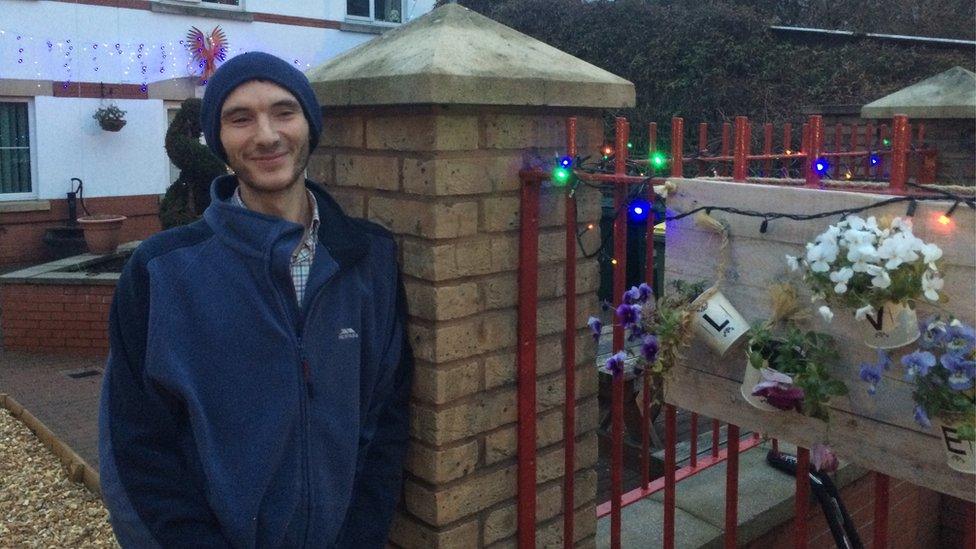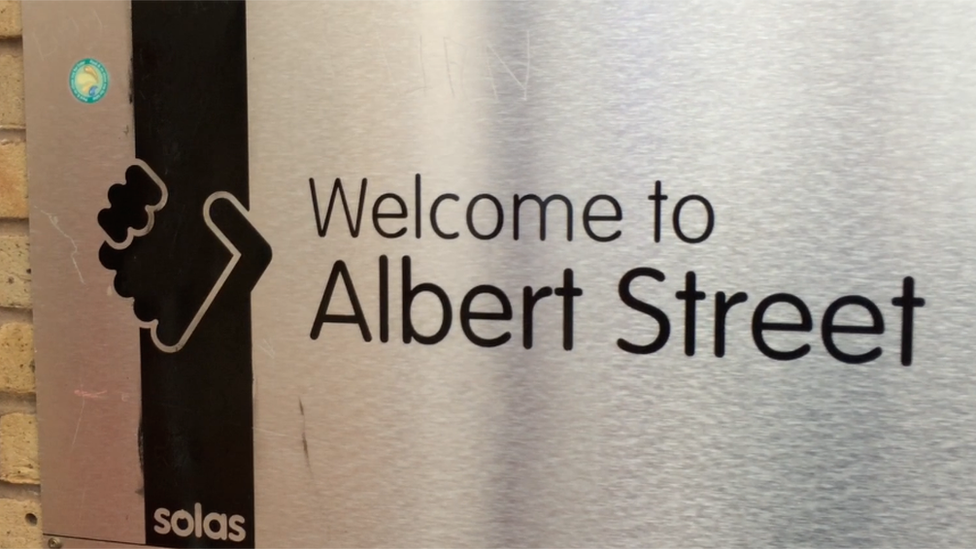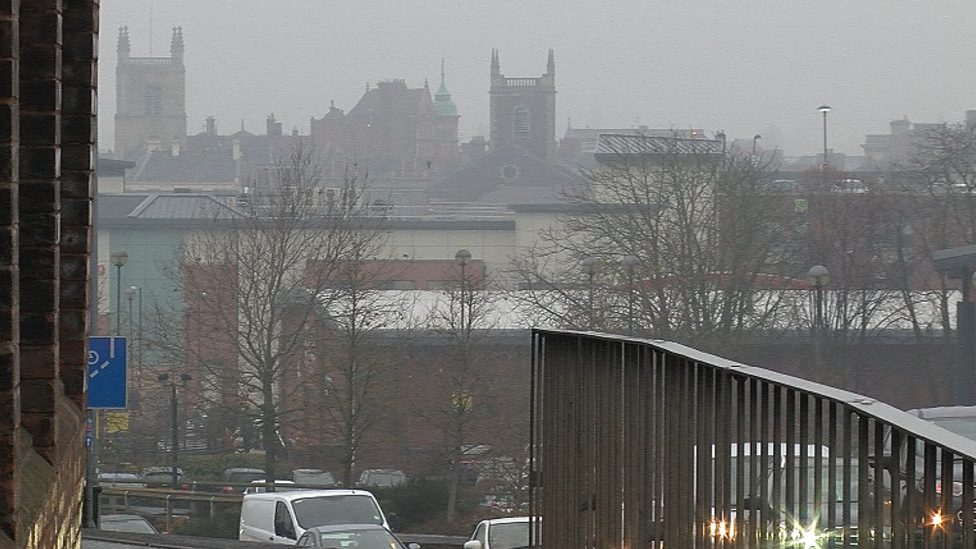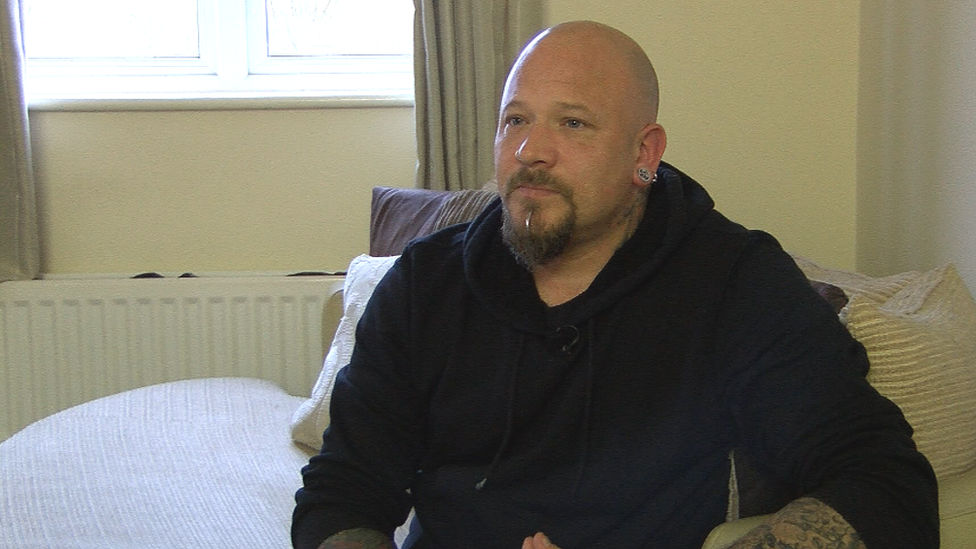Homelessness funding safeguard call by Pobl Group
- Published

Nicholas Lane: 'It's about getting you back into the swing of things, interacting with people again'
Failure to protect funding for homeless people with complex needs in Wales would be a "catastrophe", according to a major provider of supported housing.
Rhian Stone, director of care and support at Newport-based Pobl Group, said some services in England reported a rise in rough sleepers after cuts resulted in fewer homeless support workers.
The UK government removed the ring-fencing of the "supporting people" budget in England in 2010 and some councils subsequently reduced outgoings on extra help.
The Welsh Government described the money as "important" but that funding decisions beyond 2017-18 would be considered in the future.
Pobl Group includes housing associations such as Charter Housing, and sheltered accommodation providers like Gwalia and Solas, which runs education and support groups.
The group said "supporting people" funding, external has been protected by the Welsh Government in recent years, but was only guaranteed until 2017-18.
60 second explanation to the issues affecting support for homeless people
Ms Stone said: "We're very grateful that the budget is staying at its current level next year, but the demands are getting greater - we're seeing more complex needs coming through all our schemes.
"Things like domestic abuse, mental health problems, substance abuse, welfare reform."
She added that equivalent organisations in England have reported problems when some councils reduced the funding for "wrap around" services for homeless people.
"In our accommodation services there are support workers 24/7, but I've heard of services being reduced to 9am-5pm in England.
"These are people with potentially very complex and risky behaviours.
"If I had a pound for every person I spoke to who said 'if it wasn't for the service I'd be dead' I'd be very rich - and we're just one provider.
"The programme regularly saves lives, turns lives around, prevents people from being re-admitted to hospital, admitted to prison, preventing young people going into care.
"The costs associated with all that are astronomical."

What is the "supporting people" programme?
An allocation of around £124m is given by the Welsh Government to local councils which they must spend on helping "vulnerable people live as independently as possible".
That includes things like enabling older people to stay in their own home for longer, helping someone with a learning disability or providing support for housing-related issues.
Preventing homelessness is the ultimate aim, but for those who sleep on the streets or have substance misuse issues, the programme often provides more.
In England, the ring-fencing of the fund for specific areas was removed in 2010 by the Department for Communities and Local Government.
Some English councils chose to spend less than before on housing-related support, with many receiving larger cuts to their grant from Westminster than Welsh councils received from Cardiff Bay.

What is provided?

At Albert Street Hostel in Newport, Dave Howell shows me around what feels like student accommodation with kitchens, lounge areas as well as private rooms for informal counselling.
Single men and woman stay here, instead of the streets.
Nicholas Lane, 36, slept rough for a year in Newport, after taking drugs from the age of nine.
Now he's trying to stay clean and to be able to see his daughter again.
'Help in every way'
He said woodwork and DIY courses funded by the "supporting people" programme have made a big difference.
"It's about getting you back into the swing of things, interacting with people again," he said.
"They help you in every sort of way really, with depression, key worker sessions, just a lot of support here basically - and for when you leave as well."
Many in this centre also have problems with drugs or alcohol, some have had traumatic experiences as children or as adults.
Trained support staff can help talk things through and help address substance abuse.
All the help that isn't directly to do with housing is paid for via the Welsh Government's "supporting people" fund, which no longer exists in England.

What's happened in England?

Some, but not all, councils in England have reduced what they spend on similar services.
Some providers told me that means more flexibility on how they work and less paperwork than before, even if some of the more intense outreach work now relies in part on reports from volunteers.
St Paul's hostel in Worcester lost its contract for some support services with the council a few years ago.
Chief executive Jonathan Sutton admits the old system was far from perfect - there were several services which had some crossover between what they did.
He also accepts the city's new drop-in centre - with a new provider running it - has many positives.
But he still feels some vulnerable people are losing out, especially those who have deeply entrenched behaviour problems, often related to drugs or alcohol.
"I took over here three years ago and in that time I've seen the number of services and the breadth of services available to people has drastically reduced.
'Difficult decision'
"Our staffing levels are now so low that to take the most vulnerable and the most chaotic puts other people at risk.
"We're having, unfortunately, to say to people 'here is not the place for you'.
"For a charity like ourselves that's a very difficult decision to make."
Worcester City Council said it has worked with partner agencies to support people who are sleeping rough.
It said it expects the number of recorded rough sleepers in the city to drop this year as a result of some of the work it has commissioned.
Worcester County Council said while there had been reductions in staffing levels in its wider area, services were "adapting and changing" to prevent homelessness in the first place.

Peter's story

Peter Shirley: 'I wouldn't be here if it wasn't for them'
In a warm Worcester flat overlooking the city's skyline, Peter Shirley tells me about very different times.
He spent four and a half months living in a car after his marriage broke down.
"I was on medication for depression, I was self harming, I was drinking just to stay warm and help me sleep it was so cold," he said.
"I woke up stiff and had terrible back problems from lying in a two-door car all night, but it was my safe place."
He was offered a place in a hostel in Birmingham, but said he felt the area was unsafe for him to stay.
Eventually, he accepted an offer to stay with two people he thought were friends but he said they sexually assaulted him.
"I remember it well...I tried to kill myself and ended up in hospital. I didn't tell anyone about it for ages," he said.
An outreach team spoke to Peter several times before the incident, then visited him in hospital to offer him a safe place to stay.
He said it was their persistence that gave him the confidence on his road to recovery, but the outreach team is now smaller in size and relies in part on volunteers.
Public service 'demands'
"It's heartbreaking," he said. "I wouldn't be here if it wasn't for them."
Work is ongoing in Worcester to prevent homelessness.
But many providing that council-commissioned help admit that with increased demand and fewer staff they are concerned, or least, anxious about the future.
A Welsh Government spokesperson said: "The Supporting People programme plays a very important part in improving the lives of vulnerable people, tackling homelessness and reducing unnecessary demands on other public services.
"Funding decisions beyond 2017-18 will be considered as part of the budget setting process in future years."